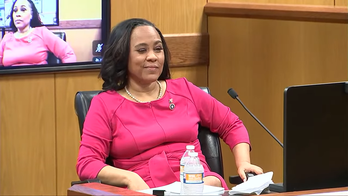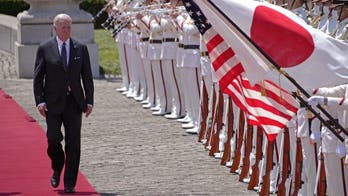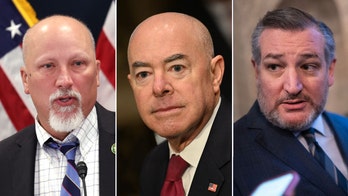Details about Edwards' affair, love child revealed
Ex-aide reveals reaction to mistress' pregnancy
John Edwards apparently didn't think too highly of his mistress.
According to testimony Tuesday from Edwards' former top confidante, the ex-senator didn't give himself great odds when he doubted that he was the father of Rielle Hunter's unborn child.
"He said that she was a crazy slut, and it was a one-in-three chance that it was his child," Young testified.
Whether or not those were the odds, Edwards made a bad bet. After denying for months that he was the father, even after he copped to the affair, Edwards has acknowledged paternity for their daughter who is now 4 years old.
Young's anecdote was just one of several titillating details that emerged during the second day of testimony in the high-profile Edwards trial. Young also described how Edwards' late wife Elizabeth learned of the affair. He said Elizabeth would answer her husband's cell phone without saying anything, allowing Hunter to start talking assuming she was having a private conversation with John.
Elizabeth later made her husband use a different phone, Young said. But Edwards evaded the attempt, telling Young to keep a "bat phone" on him by which Hunter could make contact discreetly.
In between the soap-opera-style details, Young continued to feed into the prosecution's case that Edwards helped arrange for nearly $1 million in donations to hide the affair and preserve his 2008 Democratic presidential bid.
Young testified that Edwards directed him to start giving money to Hunter in May 2007 after she threatened to go to the media and expose the affair. Young said he suggested asking Rachel "Bunny" Mellon, an elderly heiress who had already given generously to Edwards' campaign.
He claimed that Edwards became frustrated when Young expressed discomfort with the arrangement, but Edwards insisted it was fine. He said Edwards insisted on discussing the donor checks in code because he said he couldn't be tied to the scheme in case he ever had to be sworn in as U.S. attorney general.
Young also claimed it was Edwards' idea to have Young claim paternity of his child.
"If we give them something the press would understand, which was an affair between two staffers, they would go away," Young recalls Edwards saying in a phone conversation.
Young said he reluctantly went along with the plan because, at the time, he still believed in Edwards' candidacy.
As the prosecution's star witness spilled his account over the course of two days, though, new questions were emerging about his credibility.
Young's testimony is supposed to be a linchpin in the government's claim that Edwards knew two wealthy donors had contributed nearly $1 million to hide his pregnant mistress -- and in doing so violated federal campaign finance law.
But U.S. District Court Judge Catherine Eagles disclosed Monday that the former Edwards aide had recently contacted three other witnesses in the trial to ask what they planned to say. In a meeting with lawyers before the jury entered the room, Eagles also noted that Young had a one-night stand with an unidentified witness in 2007 -- the judge ruled the lawyers could not mention the one-night stand to the jury, but could mention the improper witness contact provided they didn't describe it as "witness tampering."
Young already was entering the trial with some questions in his background -- he was the aide who initially and falsely claimed he was the father of Edwards' illegitimate child.
Kieran Shanahan, a Raleigh lawyer and former federal prosecutor who is attending the trial, said the prosecution is "taking a bit of a risk" by putting their star witness on first.
"If in cross-examination they're able to destroy his credibility, it'll be very difficult for the government to recover," Shanahan said.
Prosecutors are trying to prove that the funds in question were not just private gifts to hide Edwards' affair from his cancer-stricken wife, but actual campaign contributions intended to prevent the affair from damaging his bid for president. They plan to play voicemails Edwards left on Young's phone during the campaign.
The defense claims the secret payments were not intended to influence the outcome of the election, but to spare Edwards' family pain and embarrassment. Edwards' lawyers also allege that Young used much of the money to build an upscale house for himself in Chapel Hill, N.C.
Young began to offer details Monday of the people who surrounded Edwards and put their faith in him.
The former campaign worker, who testified in exchange for immunity, told the court Monday about a meeting he attended with Mellon.
"I'm going to do everything I can to help you become president of the United States," Mellon told Edwards, according to Young.
On the witness stand Monday, Young recounted how he met Edwards in 1998, as the Raleigh trial lawyer and political neophyte was campaigning for the Senate.
"My father was a minister, so I had seen a lot of great speakers," Young recounted. "He was really `on' that day."
Young said he immediately told his future wife, Cheri Young, that Edwards had the potential to become president and that he wanted to work for him. Young quickly rose from a junior campaign staffer to working on the senator's North Carolina staff following the election. When no one else wanted to pick up Edwards at the airport, Young leaped at the opportunity. He eventually became special assistant to the senator, a gatekeeper who got phone calls and face time with Edwards.
The federal trial comes more than four years after Edwards ended his Democratic presidential bid and went on to watch his reputation crumble under the weight of the emerging scandal. He has gone from battling reporters to battling prosecutors who seized upon the scheme as an alleged campaign finance breach. While the lurid details of his affair dominated the headlines going into the summer of 2008, the focus of the trial is the money trail.
Edwards faces six criminal counts of campaign finance violations for allegedly accepting, and failing to report, campaign donations in excess of the $2,300 limit for individual contributions. If convicted, he could face up to 30 years in prison and $1.5 million in fines.
Fox News' Jonathan Serrie and The Associated Press contributed to this report.





